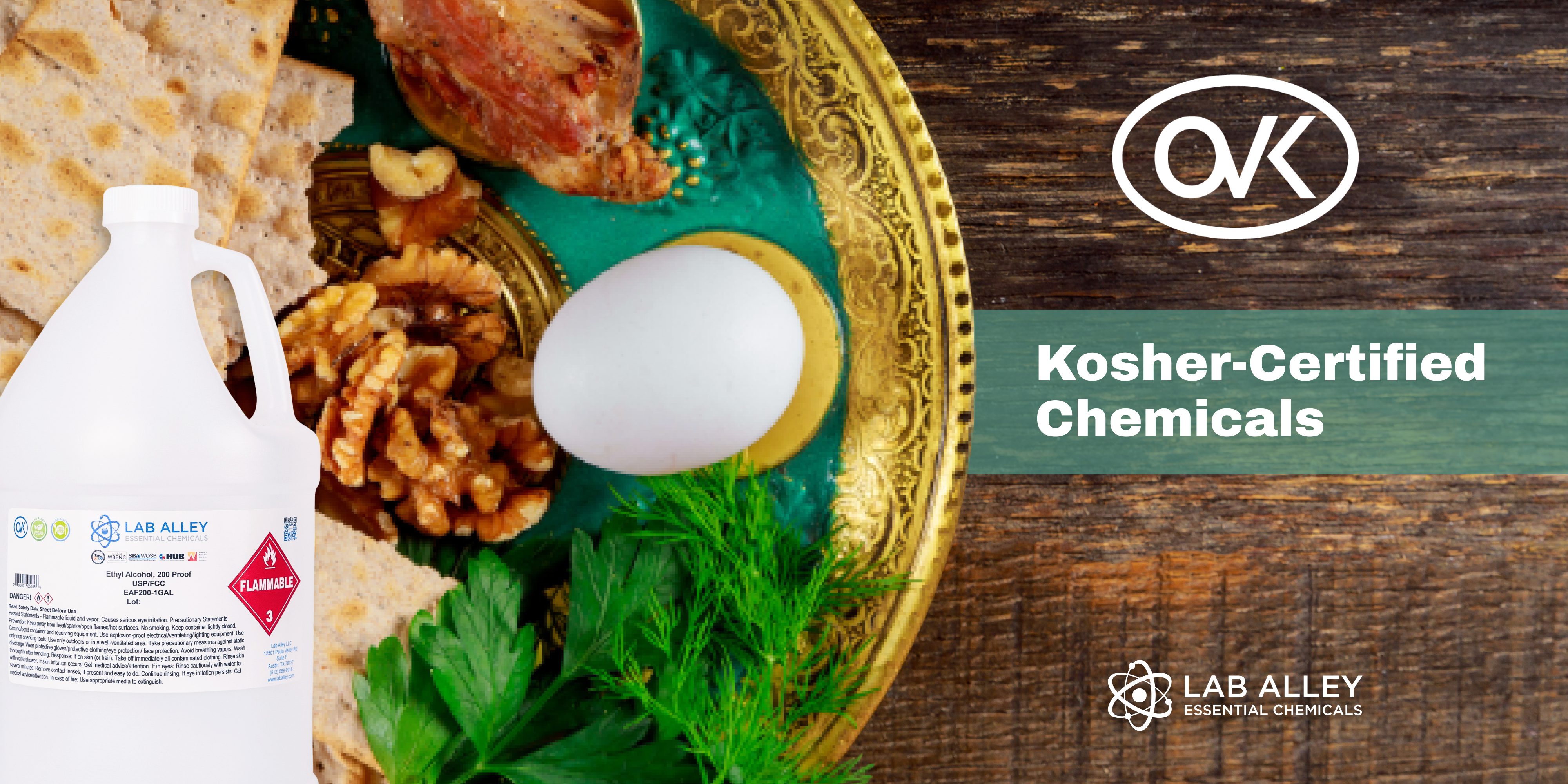Kosher Certification

The Importance of Kosher Certification in the Food and Beverage Industry
If you’re a business owner in the food and beverage industry, then you might be aware of consumer demand for product labels displaying the Kosher Certification. But did you know that the most recent Lubicom Marketing Consulting research data indicates that kosher has developed into a $12.5 billion industry?
At Lab Alley, we make it our priority to anticipate the needs of our valued customers and transparently share this information in an effort to lead the collective responsibility towards a greener planet.
Not only does Kosher Certification hold cultural and religious importance for many consumers, but it’s often considered as a mark of a higher quality product in general. According to the Jewish Initiative for Animals (JIFA), 74% of Americans choose kosher based on concerns for food safety. That’s because the Kosher Certification is concerned not only with the final product but also the entire production process. Every chemical or processing aid the product comes into contact with must be verified as kosher.
The ethical and cultural significance of kosher products across numerous industries is important to recognize and is why we have recently sought and received Kosher Certification under the supervision of the OV Kosher by the Vaad Hoeir of St. Louis.
Considering Kosher Certification for your products? You’ve come to the right place. In this article, we’ll break down:
- What is kosher?
- What does the Kosher Certification process look like?
- What are the benefits of Kosher Certification?
- Kosher trends in the food and beverage industry
- What kosher means for you, as a business owner
What is Kosher?
The kosher designation for foods and chemicals means that the ingredients and production comply with Jewish dietary law. The word itself is derived from the Hebrew word for “proper” or “correct.” Food products may be classified as Meat, Dairy, or Pareve.
Kosher Certification is important for those in the Jewish community who observe kashrut, the Jewish dietary law as laid out in the Torah. For example, the law specifies that only certain animals should be eaten as food and must be killed in a particular way. For example, kosher chemicals may be used as ingredients, processing aids, or even for cleaning equipment. Meat and dairy must always be kept separate and not consumed together.
Over time, these laws have needed further clarification in the context of the modern world. Industrial food production and chemical manufacturing did not exist when the Torah was written. To solve this problem, rabbinic scholars have interpreted laws so modern processes may still comply with an expanded definition.
What is the Kosher Certification Process?
It is not enough for the food products to comply with kosher law. To achieve the Kosher Certification, products require official approval by a rabbi who has overseen the facility and manufacturing process.
This process sets kosher chemicals apart from USP or FCC-grade chemicals, which instead require stringent analytical testing to verify the purity of the final product. Chemicals intended for use in kosher food products must achieve both certifications.
Kosher Benefits
An obvious benefit of Kosher Certification is appealing to potential consumers in the Jewish community. Although only those who observe kashrut eat exclusively kosher, many in the Jewish community prefer kosher options when it is available to them.
On the flip side, many consumers of kosher foods are not even Jewish. kosher-certified products may be perceived as having a higher value, since the processing requirements are so stringent. Unlike the FCC and USP monograms which regulate based on the purity of the final product, Kosher Certification is concerned with every part of the processing and sourcing.
Kosher Trends in the Food and Beverage Industry
The food market has been continually trending towards more inclusivity for consumers with dietary restrictions, including kosher, halal, and vegan. With the increasing number of food innovations available to consumers, the Kosher Certification is one excellent way to make your offerings stand out.
A famous example of a food product undergoing the conversion from non-kosher to kosher is the story of the kosher Oreo. The original Oreo recipe contained lard, an animal fat sourced from pigs. The recipe had to be reformulated since pigs are not to be eaten under Jewish dietary law. Furthermore, all of the manufacturing ovens had to be “koshered” by a rabbi, using a blowtorch to burn off any residuals of forbidden food.
What Kosher Means for You
As a business owner or product developer in the food and beverage industry, Kosher Certification can help to improve the quality and marketability of your offerings in a variety of ways:
Marketing Competitiveness: In a crowded marketplace, having kosher-certified products can give your business a competitive edge. With the kosher food market valued at $12.5 billion, showcasing your Kosher Certification can help your brand stand out.
Elevated End Products: Kosher Certification involves rigorous standards not only for the final product, but for every ingredient and processing aid used. This care and attention to detail can enhance the overall quality and safety of your products, making them more appealing to discerning customers. High-quality products often translate to better customer satisfaction and repeat business.
Increased Revenue: By appealing to a broader audience – including both Jewish consumers and those who perceive kosher products as higher quality – you can tap into new revenue streams. Kosher Certification can also open doors to additional markets and distribution channels, further boosting your sales potential.
Sustainability and Green Practices: Aligning your business practices with standards set by Kosher Certification can improve your environmental footprint and appeal to eco-conscious consumers. This commitment to sustainability demonstrates that your brand values both quality of product and environmental responsibility.
Incorporating Kosher Certification into your production standards is more than just a compliance measure – it’s a strategic investment that can elevate your products, signify positive brand impact, and drive business growth.
Shop our Certified Kosher products hassle-free with easy order placement, transparent pricing, and fast delivery.

